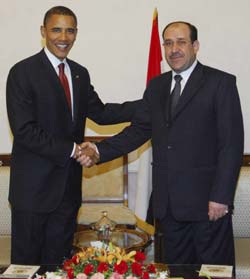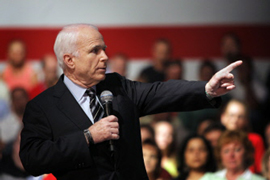Let me start by saying thanks to FR Publisher Jon Fleischman for welcoming me back to the Flash Report Blog. As Jon has mentioned previously, I was FR’s first San Bernardino County correspondent almost three years ago. After 14 months I left in order to focus on becoming a San Bernardino County Supervisor. Now that I’ve achieved that goal, I really appreciate this opportunity to return and pick right back up where I left off — almost two years later.
So what’s changed since we last talked?
One thing for certain has changed, I thought as I perused the latest news accounts of the Iraq situation vis-à-vis the Presidential candidates. And that is, how much things have changed in Iraq. And as Sen. Barack Obama arrived in Iraq today
Obama’s 2006 visit to Iraq (his first and only other visit besides today’s) was marked by the kidnapping of a U.S. journalist by Sunni insurgents earlier that day and rising sectarian violence that exploded a month later when militants blew up a Shia shrine in Samarra. At the time, Obama likened aid to Iraq to pouring water into a bucket full of holes. "The analogy I would use is that it is going to be hard to convince American taxpayers to pour water into a leaky bucket," he was quoted as saying then.
Well, it turns out the bucket did hold water. In contrast to Obama’s assessments are those of the Presidential candidate who was right about the situation in Iraq, then and now. Sen. John McCain, who has visited Iraq eight times, was a leading proponent of the successful troop surge of 2007. As today’s Business Standard noted: "Obama is returning at a time when violence has fallen to a four-year low, partly on the back of a US troop ‘surge’ which he had strongly opposed."
 Yet still Obama continues to characterize the situation in Iraq as a lost cause, and now he advocates a pullout within 16 months of his election. Never mind that he’s telling our enemies exactly how long it will take for an Obama administration to turn tail and run from a military victory. Honestly, he’s making a campaign promise to retreat from a military operation!
Yet still Obama continues to characterize the situation in Iraq as a lost cause, and now he advocates a pullout within 16 months of his election. Never mind that he’s telling our enemies exactly how long it will take for an Obama administration to turn tail and run from a military victory. Honestly, he’s making a campaign promise to retreat from a military operation!
Predictably and correctly, McCain says setting such timelines, because it’s impossible to predict the situation on the ground when that time comes, is irresponsible. And Iraqi Prime Minister Nuri al-Maliki’s apparent endorsement of such a timeline is likely a political posture aimed at blunting nationalistic criticism from radical Cleric Muqtada Al Sadr in advance of upcoming parliamentary elections.
I should clarify that when I say "military victory", that doesn’t necessarily mean victory. When I say "victory", it is at this point only realistic, in light of public opinion, to avoid failure, which I would define as leaving the country worse off than it was when American troops toppled the totalitarian government and defeated Hussein’s military in 2003.
This all hits home with me as a veteran of Operation Desert Storm and considering the fact that hundreds more National Guardsmen from the Inland Empire have been departing over the past week to pre-deployment training for convoy security near Saddam Hussein’s hometown of Tikrit. Many of these soldiers are embarking on their second or even third tour in Iraq. Certainly we don’t want to see the sacrifices of these troops, and especially those who have given their lives during this operation, to be for naught.
 As previously stated, violence in Iraq has dropped significantly. However, reality and the situation on the ground present more complicated issues that require more than simply reducing violence. Political and economic stability are not achieved overnight, and while the gains on the ground are impressive, they are tentative and can be squandered if an "exit plan" is enacted too soon.
As previously stated, violence in Iraq has dropped significantly. However, reality and the situation on the ground present more complicated issues that require more than simply reducing violence. Political and economic stability are not achieved overnight, and while the gains on the ground are impressive, they are tentative and can be squandered if an "exit plan" is enacted too soon.
The troop surge did help reduce violence from its height in May 2007. This was due mainly to the increased presence of U.S. troops from 130,000 in May 2007 to close to 170,000 in September 2007. The surge allowed an increase in combat outposts, which in turn allowed troops to get out into the Iraqi communities. With the local commanders close to the population, security and economic issues are not as difficult to solve with the local populace gaining confidence that their neighborhoods and commerce areas are secure from terrorists or internal strife.
The second reason for the decrease in violence is U.S. support of the "Sons of Iraq" groups, formerly called "Concerned Local Citizens". These groups comprise many local citizens, some of whom are likely to have been formerly affiliated with terrorist groups, who are being supported financially and otherwise by the U.S. to secure their neighborhoods. These groups are predominantly Sunni and have helped deal a severe blow to the foreign-fighter-heavy Al Qaeda terrorist groups.
In the southern part of the country, the Shia militias are quiet after being dealt heavy casualties by Coalition forces last summer. The Mehdi Army, led by Al Sadr, has been quiet in recent months since Al Sadr announced an extension to last year’s ceasefire.
The situation in Iraq is worlds apart from where it was just a year ago, but the U.S. and Coalition forces still have a long way to go. The Sons of Iraq groups are supportive of Coalition efforts but may decide not to continue if they are not supported and sustained in the event of a U.S. "departure". This would result in a large portion of the country, perhaps about 20%, suddenly unaffiliated, poor and, needless to say, not happy. It’s anyone’s guess what profession they might turn or return to.
The Shia areas are currently fighting both militarily and politically for power. With the largest, richest oilfield in the world underneath them, the amount of money gained and lost is likely to be viciously fought over for some time. With 70% of Iraq’s population, the Shia control the government and where most of the government revenue is distributed. The Shia were also the oppressed party during Saddam Hussein’s reign. There still remains a deep grudge against the Sunnis, which would likely be revived when the U.S. leaves. This would pit the countries of the region behind the religious groups and likely result in civil war. The Sunnis are strongly backed by the Saudis, Syrians and Jordanians, while the Shia are backed by Iran. There is little doubt the region would become much more volatile in a very short time after the U.S. Military leaves.
While there is indeed a new light at the end of the tunnel for a U.S. withdrawal from Iraq with a victory, the potential for disaster is still high. Considering this and the very short history of peace in the region, shouldn’t we give the benefit of the doubt to the military leadership, which by the way is also critical of Obama’s 16-month-retreat campaign promise?


July 22nd, 2008 at 12:00 am
LOL – Brad has been gone long enough that I forgot his two favorite ways to bug the Editor — blog posts that are too long, that aren’t about California politics.
WELCOME BACK BRAD!!
Great piece.